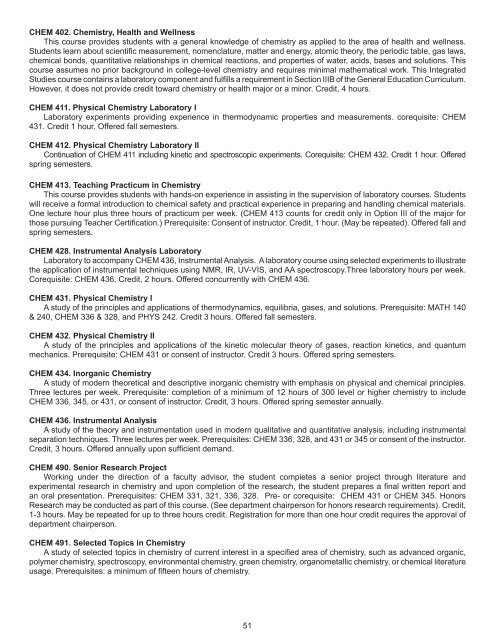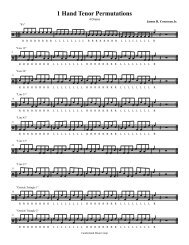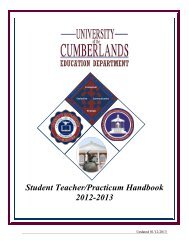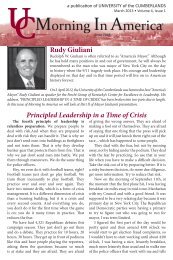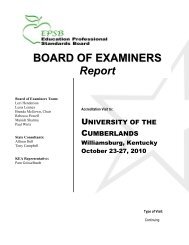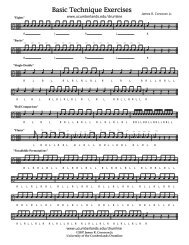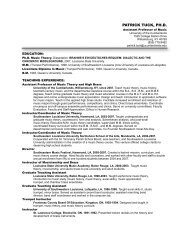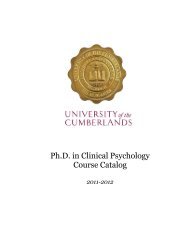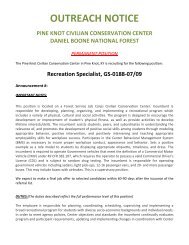2013â2014 Undergraduate Catalog - University of the Cumberlands
2013â2014 Undergraduate Catalog - University of the Cumberlands
2013â2014 Undergraduate Catalog - University of the Cumberlands
You also want an ePaper? Increase the reach of your titles
YUMPU automatically turns print PDFs into web optimized ePapers that Google loves.
CHEM 402. Chemistry, Health and Wellness<br />
This course provides students with a general knowledge <strong>of</strong> chemistry as applied to <strong>the</strong> area <strong>of</strong> health and wellness.<br />
Students learn about scientific measurement, nomenclature, matter and energy, atomic <strong>the</strong>ory, <strong>the</strong> periodic table, gas laws,<br />
chemical bonds, quantitative relationships in chemical reactions, and properties <strong>of</strong> water, acids, bases and solutions. This<br />
course assumes no prior background in college-level chemistry and requires minimal ma<strong>the</strong>matical work. This Integrated<br />
Studies course contains a laboratory component and fulfills a requirement in Section IIIB <strong>of</strong> <strong>the</strong> General Education Curriculum.<br />
However, it does not provide credit toward chemistry or health major or a minor. Credit, 4 hours.<br />
CHEM 411. Physical Chemistry Laboratory I<br />
Laboratory experiments providing experience in <strong>the</strong>rmodynamic properties and measurements. corequisite: CHEM<br />
431. Credit 1 hour. Offered fall semesters.<br />
CHEM 412. Physical Chemistry Laboratory II<br />
Continuation <strong>of</strong> CHEM 411 including kinetic and spectroscopic experiments. Corequisite: CHEM 432. Credit 1 hour. Offered<br />
spring semesters.<br />
CHEM 413. Teaching Practicum in Chemistry<br />
This course provides students with hands-on experience in assisting in <strong>the</strong> supervision <strong>of</strong> laboratory courses. Students<br />
will receive a formal introduction to chemical safety and practical experience in preparing and handling chemical materials.<br />
One lecture hour plus three hours <strong>of</strong> practicum per week. (CHEM 413 counts for credit only in Option III <strong>of</strong> <strong>the</strong> major for<br />
those pursuing Teacher Certification.) Prerequisite: Consent <strong>of</strong> instructor. Credit, 1 hour. (May be repeated). Offered fall and<br />
spring semesters.<br />
CHEM 428. Instrumental Analysis Laboratory<br />
Laboratory to accompany CHEM 436, Instrumental Analysis. A laboratory course using selected experiments to illustrate<br />
<strong>the</strong> application <strong>of</strong> instrumental techniques using NMR, IR, UV-VIS, and AA spectroscopy.Three laboratory hours per week.<br />
Corequisite: CHEM 436. Credit, 2 hours. Offered concurrently with CHEM 436.<br />
CHEM 431. Physical Chemistry I<br />
A study <strong>of</strong> <strong>the</strong> principles and applications <strong>of</strong> <strong>the</strong>rmodynamics, equilibria, gases, and solutions. Prerequisite: MATH 140<br />
& 240, CHEM 336 & 328, and PHYS 242. Credit 3 hours. Offered fall semesters.<br />
CHEM 432. Physical Chemistry II<br />
A study <strong>of</strong> <strong>the</strong> principles and applications <strong>of</strong> <strong>the</strong> kinetic molecular <strong>the</strong>ory <strong>of</strong> gases, reaction kinetics, and quantum<br />
mechanics. Prerequisite: CHEM 431 or consent <strong>of</strong> instructor. Credit 3 hours. Offered spring semesters.<br />
CHEM 434. Inorganic Chemistry<br />
A study <strong>of</strong> modern <strong>the</strong>oretical and descriptive inorganic chemistry with emphasis on physical and chemical principles.<br />
Three lectures per week. Prerequisite: completion <strong>of</strong> a minimum <strong>of</strong> 12 hours <strong>of</strong> 300 level or higher chemistry to include<br />
CHEM 336, 345, or 431, or consent <strong>of</strong> instructor. Credit, 3 hours. Offered spring semester annually.<br />
CHEM 436. Instrumental Analysis<br />
A study <strong>of</strong> <strong>the</strong> <strong>the</strong>ory and instrumentation used in modern qualitative and quantitative analysis, including instrumental<br />
separation techniques. Three lectures per week. Prerequisites: CHEM 336, 328, and 431 or 345 or consent <strong>of</strong> <strong>the</strong> instructor.<br />
Credit, 3 hours. Offered annually upon sufficient demand.<br />
CHEM 490. Senior Research Project<br />
Working under <strong>the</strong> direction <strong>of</strong> a faculty advisor, <strong>the</strong> student completes a senior project through literature and<br />
experimental research in chemistry and upon completion <strong>of</strong> <strong>the</strong> research, <strong>the</strong> student prepares a final written report and<br />
an oral presentation. Prerequisites: CHEM 331, 321, 336, 328. Pre- or corequisite: CHEM 431 or CHEM 345. Honors<br />
Research may be conducted as part <strong>of</strong> this course. (See department chairperson for honors research requirements). Credit,<br />
1-3 hours. May be repeated for up to three hours credit. Registration for more than one hour credit requires <strong>the</strong> approval <strong>of</strong><br />
department chairperson.<br />
CHEM 491. Selected Topics in Chemistry<br />
A study <strong>of</strong> selected topics in chemistry <strong>of</strong> current interest in a specified area <strong>of</strong> chemistry, such as advanced organic,<br />
polymer chemistry, spectroscopy, environmental chemistry, green chemistry, organometallic chemistry, or chemical literature<br />
usage. Prerequisites: a minimum <strong>of</strong> fifteen hours <strong>of</strong> chemistry.<br />
51


